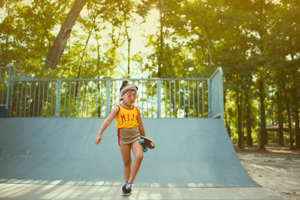 by Kathryn Streeter
by Kathryn Streeter
Summer is greeting us with her cheerful grin, but parents who couldn’t come up for the air needed to plan for her grand entrance are not doing a happy dance. It looms instead like an epic black hole, begging for definition. Camp registration deadlines came and went a long time ago, but maybe, your kids aren’t keen on camp, anyway. You don’t want summer to be a chore for you or your kids. So, what’s a good parent to do?
There are plenty of life-changing ways to occupy your children over the summer besides sending them to camp and, ample evidence that these experiences are deeply formative. In my case, an older friend needed help weeding her flower garden and asked if my 12-yr-old daughter (who wasn’t a camp-loving girl) wanted to earn some cash. In fact, she did, and though it was a hot, humid undertaking, my daughter was glad she said yes. Weeding side-by-side, the two bonded over their love of fiction and started their own book club, reading “The Wheel On the School”, “Ruby Holler” and “Number the Stars”. My daughter grew from that summer, on her knees beside my dear old friend, picking weeds and talking books.
What is monumental in the lives of our kids is often the stuff that lies outside the home, period—those situations in the non-shared environment, which build the strong life-altering moments affecting our kids’ futures. It’s hard to swallow, isn’t it? While the steady environment of the home isn’t to be diminished, the experiences outside the home —camp, service-programs, sleepovers, church trips, part-time jobs, babysitting, volunteer work, walking the neighbor’s dog—offer disproportionate benefits for kids.
In the International Journal of Epidemiology article, Why are children in the same family so different from one another? researchers explain that it is precisely experiences away from home and immediate family that distinguish a child from siblings. The “environmental variance” is the framework for the magical making of a unique person. Licensed counselor and founder of Bright Future Consulting, Dr. Beth Dennard said that spending a summer at her aunt’s farm in Florida was one formative non-shared experience she benefitted greatly from as a child. Dennard, who is fascinated by adolescent development and serves Houston families from three consulting locations, says aloud what parents are feeling: “Non-shared environments are tough on parents and kids, but they are necessary for students to individuate and become adults.” Tough is universally appreciated, but perhaps the necessary is worth revisiting.
Dr. Laura Markham of AhaParenting.com says if there’s one word which sums up the rewards of these cumulative non-shared experiences it’s confidence. “I think kids discover new capabilities when they are in new environments that ask them to engage in new ways and gain confidence from those experiences,” Markham says, author of the newly released, “Peaceful Parent, Happy Kids Workbook”. Exposure to experiences sans immediate family is critical for development. “During adolescence, there is a shift from focusing the majority of a child’s attention on parents and home to focusing on peers and life outside the home,” explains Dennard.
It’s one thing to accept in theory, but in practice, this can be a terrifying transition for parents. “More learning occurs when human beings stretch, not when they’re cozy,” Dennard says. She points out that an easy example of this is when teens start driving. Once a teen passes their driver’s test, they occupy a non-shared environment. Dennard continues, “Many Houston parents freak out when they even think about their kids driving; Houston traffic is so bad and the risks so high, but driving independently is a step toward adulthood. In real life, there are seat belts and air bags for safety but each adult person must accept the responsibility and assume the risks to drive and ultimately they do the same as they leave home to live independently.”
The potential for our blossoming child’s view of the world to expand and take shape under the watchful eyes of trusted adults is another compelling reason to get our kids engaged outside our homes. “As an educational consultant, I’m one of those trusted adults and I take my mentoring role seriously,” remarks Dennard who daily works with middle-school and high school students. Markham says that having someone outside the family depend on them helps a young person see himself in a new light. “Often, kids discover that they’re good at something they hadn’t seen as valuable, or find deep emotional rewards in a connection they would never have made otherwise. At the very least, they learn something about how the world works outside their home.”
To parents who failed to meet camp deadlines, can’t afford typical structured summer programming or whose child rebels against all of the above, Markham confirms that there are endless other avenues to enrich kids over the summer to help them “become more independent, capable and responsible”. By welcoming opportunities for our young people to expand out of our eyeshot, we help them sort out their identity. Discover and strengthen their personhood. In short, we help them on their journey toward happy, well-adjusted adulthood.
Kathryn Streeter writes for Houston Family Magazine. Find her on Twitter, @streeterkathryn.
View the original article on the Houston Family Magazine website.
